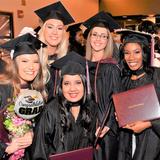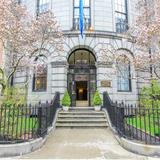- The Urban College of Boston (UCB) is an independent, co-educational two-year institution located in the heart of downtown Boston. UCB is chartered by the Commonwealth of Massachusetts to offer programs of study leading to the Associate of Arts degree in Early Childhood Education, Human Services Administration and General Studies. UCB also offers a range of certificate programs and continuing education courses.
School Highlights
Urban College of Boston serves 1,192 students (1% of students are full-time).
The college's student-teacher ratio of 27:1 is higher than the state community college average of 12:1.
Minority enrollment is 94% of the student body (majority Hispanic), which is more than the state average of 57%.
Quick Facts (2026)
- Enrollment: 1,192 students
- Private-state tuition: $7,114
- Student-teacher ratio: 27:1
- Minority enrollment: 94%
- Source: Integrated Postsecondary Education Data System (IPEDS)
Top Rankings
Urban College of Boston ranks among the top 20% of public schools in Massachusetts for:
Category
Attribute
School Resources
School Overview
The teacher population of 44 teachers has stayed relatively flat over five years.
Urban College of Boston
(MA) Community College Avg.
Carnegie Classification
Special Focus Two-Year: Other Fields
Associate's Colleges: Mixed Transfer/Career & Technical-Mixed Traditional/Nontraditional
Institution Level
At least 2 but less than 4 years
At least 2 but less than 4 years
Institution Control
Private not-for-profit
Public
Total Faculty
44 staff
290 staff
School Calendar
Student Body
The student population of Urban College of Boston has grown by 115% over five years.
The student-teacher ratio of 27:1 has decreased from 43:1 over five years.
The Urban College of Boston diversity score of 0.61 is less than the state average of 0.74. The school's diversity has stayed relatively flat over five years.
Total Enrollment
1,192 students
2,687 students
Student-Teacher Ratio
27:1
12:1
# Full-Time Students
11 students
1,039 students
# Part-Time Students
1,181 students
1,648 students
# Enrollment Undergraduate
119 students
278 students
# Full-Time Undergraduate Students
11 students
839 students
# Full-Time Graduate Students
n/a
217 students
# Part-Time Undergraduate Students
1,181 students
1,619 students
# Part-Time Graduate Students
n/a
346 students
Total Dormitory Capacity
n/a
400 students
% American Indian/Alaskan
n/a
n/a
% Asian
10%
6%
% Hispanic
59%
21%
% Black
14%
15%
% White
6%
43%
% Hawaiian
n/a
1%
% Two or more races
3%
3%
% Non Resident races
n/a
2%
% Unknown races
8%
9%
Diversity Score
0.61
0.74
College Completion Rate (Students who graduate in less than 4 years)
12%
21%
College Completion Rate (Students who graduate in 4 years or more than 4 years)
n/a
45%
Average Graduate Earnings (10 Years)
$25,400
$35,500
Tuition and Acceptance Rate
The private state tuition of $7,114 is less than the state average of $30,006. The private state tuition has stayed relatively flat over four years.
Private State Tuition Fees
$7,114
$30,006
Tuition Notes
$317 per credit
% Students Receiving Some Financial Aid
100%
87%
Median Debt for Graduates
n/a
$11,249
Median Debt for Dropouts
n/a
$5,500
Acceptance Rate
n/a
75%
SAT Reading
n/a
540
SAT Math
n/a
535
SAT Writing
n/a
480
ACT Composite
n/a
21
Source: 2024 (or latest year available) Integrated Postsecondary Education Data System (IPEDS) , School Administrators
School Notes
- The Urban College of Boston was established to provide post-secondary educational and professional mobility to members of the urban community who have been traditionally under-served by higher education. The Urban College was founded by Action for Boston Community Development, Inc. (ABCD), which is one of the nation's largest community action agencies and Boston's official antipoverty agency. In 1967, ABCD launched the Urban College Program in an effort to meet the educational, employment and career development needs of the adult community. The Urban College Program quickly attracted the enthusiastic collaboration of major Boston area colleges and universities, enabling men and women over the ensuing years to earn academic credits toward undergraduate and graduate degrees while acquiring job-related skills. Twenty years later, preparations began to obtain independent degree-granting status. In May 1993, the Higher Education Coordinating Council of the Commonwealth of Massachusetts voted unanimously to charter the Urban College of Boston. In January 1994, the Urban College of Boston proudly enrolled its first degree candidates, men and women who had chosen the road to personal and professional fulfillment with an institution created specifically to support and foster their ambitions. UCB serves more than 700 students each semester through associate degree programs in Early Childhood Education, Human Services Administration, and General Studies, as well as a variety of certificate and continuing education program. The Urban College of Boston is accredited by the Commission on Institutions of Higher Education of the New England Association of Schools and Colleges, Inc. (NEASC).
Frequently Asked Questions
How much does Urban College of Boston cost?
Urban College of Boston's private state tuition is approximately $7,114.
What is Urban College of Boston's ranking?
Urban College of Boston ranks among the top 20% of community college in Massachusetts for: Average community college minority breakdown and Percent of students receiving financial aid.
In what neighborhood is Urban College of Boston located?
Urban College of Boston is located in the Downtown neighborhood of Boston, MA.
Recent Articles

Community College Policies and Financial Aid Guide 2026
A 2026 guide to community college policies and financial aid, including FAFSA updates, state aid, tuition rules, and smart planning tips.

Get Better Grades in Community College by Being Social (2026 Update)
Learn how being social in community college boosts grades, retention, and career success. Updated 2026 strategies for academic achievement.

Navigating Community College as an Adult Learner in 2026
A practical 2026 guide for adults returning to community college, covering admissions, financial aid, career planning, and flexible learning options.











